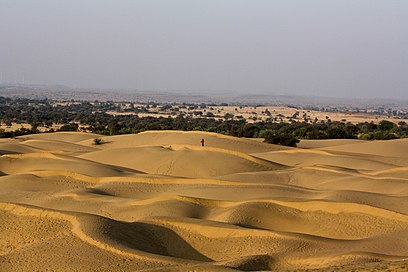Thar Marusthal: Unterschied zwischen den Versionen
Aus Yogawiki
Keine Bearbeitungszusammenfassung |
Keine Bearbeitungszusammenfassung |
||
| Zeile 2: | Zeile 2: | ||
https://upload.wikimedia.org/wikipedia/commons/thumb/9/92/Thar_desert_Rajasthan_India.jpg/408px-Thar_desert_Rajasthan_India.jpg | https://upload.wikimedia.org/wikipedia/commons/thumb/9/92/Thar_desert_Rajasthan_India.jpg/408px-Thar_desert_Rajasthan_India.jpg | ||
https://upload.wikimedia.org/wikipedia/commons/thumb/6/6d/Khejri.jpg/450px-Khejri.jpg | https://upload.wikimedia.org/wikipedia/commons/thumb/6/6d/Khejri.jpg/450px-Khejri.jpg | ||
https://upload.wikimedia.org/wikipedia/commons/thumb/b/be/1-IMG_0117_01.JPG/375px-1-IMG_0117_01.JPG | https://upload.wikimedia.org/wikipedia/commons/thumb/b/be/1-IMG_0117_01.JPG/375px-1-IMG_0117_01.JPG | ||
Aktuelle Version vom 21. Februar 2024, 12:15 Uhr
Thar Marusthal (Hindi: थार मरुस्थल thār marusthal m.) die Wüste (Marusthal) Thar, auch die Große Indische Wüste genannt. Sie befindet sich im Gebiet von Rajasthan, im Süden von Haryana und Panjab und im Norden von Gujarat. Nach Westen hin erstreckt sie sich ins Gebiet von Pakistan.



Eine typische Baumart der Wüste Thar ist der Shami (Prosopis cineraria).